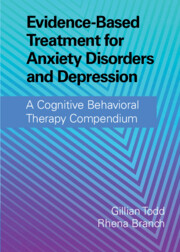 Evidence-Based Treatment for Anxiety Disorders and Depression
Evidence-Based Treatment for Anxiety Disorders and Depression from Part Three - Cognitive Behavioral Therapy for Obsessive-Compulsive Disorder and Associated Disorders
Published online by Cambridge University Press: 06 January 2022
Patients with hoarding disorder (HD) experience difficulties discarding that result in excess clutter in the home. HD causes distress and impairment for patients and family members and represents a significant public health burden, highlighting a need for treatment research. In this chapter, we provide an overview of cognitive behavioral therapy (CBT) for hoarding, a promising avenue to treat core HD features in a collaborative and time-limited manner. We begin by discussing etiological factors for HD, including familial features, information-processing deficits, and core beliefs about the self and possessions. Next, we describe HD assessment, including standardized measures and case conceptualization considerations. After discussing the research evidence for individual and group CBT for HD, we provide an overview of treatment components, including psychoeducation, motivational enhancement, skills training, behavioral exposures, cognitive techniques, and relapse prevention. Barriers to treatment are also considered. We end with a case vignette illustrating the successful application of CBT for HD in an individual outpatient setting.
To save this book to your Kindle, first ensure no-reply@cambridge.org is added to your Approved Personal Document E-mail List under your Personal Document Settings on the Manage Your Content and Devices page of your Amazon account. Then enter the ‘name’ part of your Kindle email address below. Find out more about saving to your Kindle.
Note you can select to save to either the @free.kindle.com or @kindle.com variations. ‘@free.kindle.com’ emails are free but can only be saved to your device when it is connected to wi-fi. ‘@kindle.com’ emails can be delivered even when you are not connected to wi-fi, but note that service fees apply.
Find out more about the Kindle Personal Document Service.
To save content items to your account, please confirm that you agree to abide by our usage policies. If this is the first time you use this feature, you will be asked to authorise Cambridge Core to connect with your account. Find out more about saving content to Dropbox.
To save content items to your account, please confirm that you agree to abide by our usage policies. If this is the first time you use this feature, you will be asked to authorise Cambridge Core to connect with your account. Find out more about saving content to Google Drive.